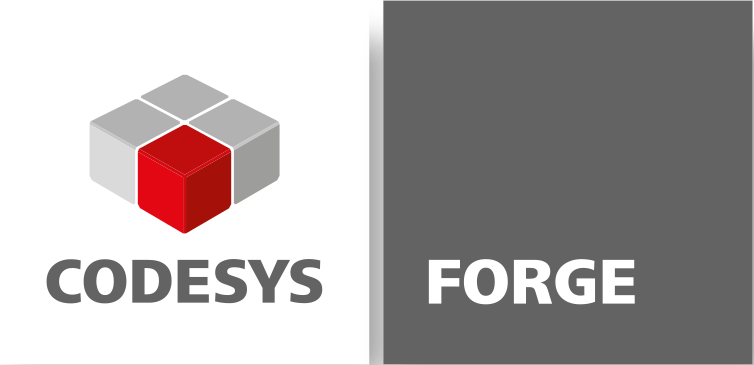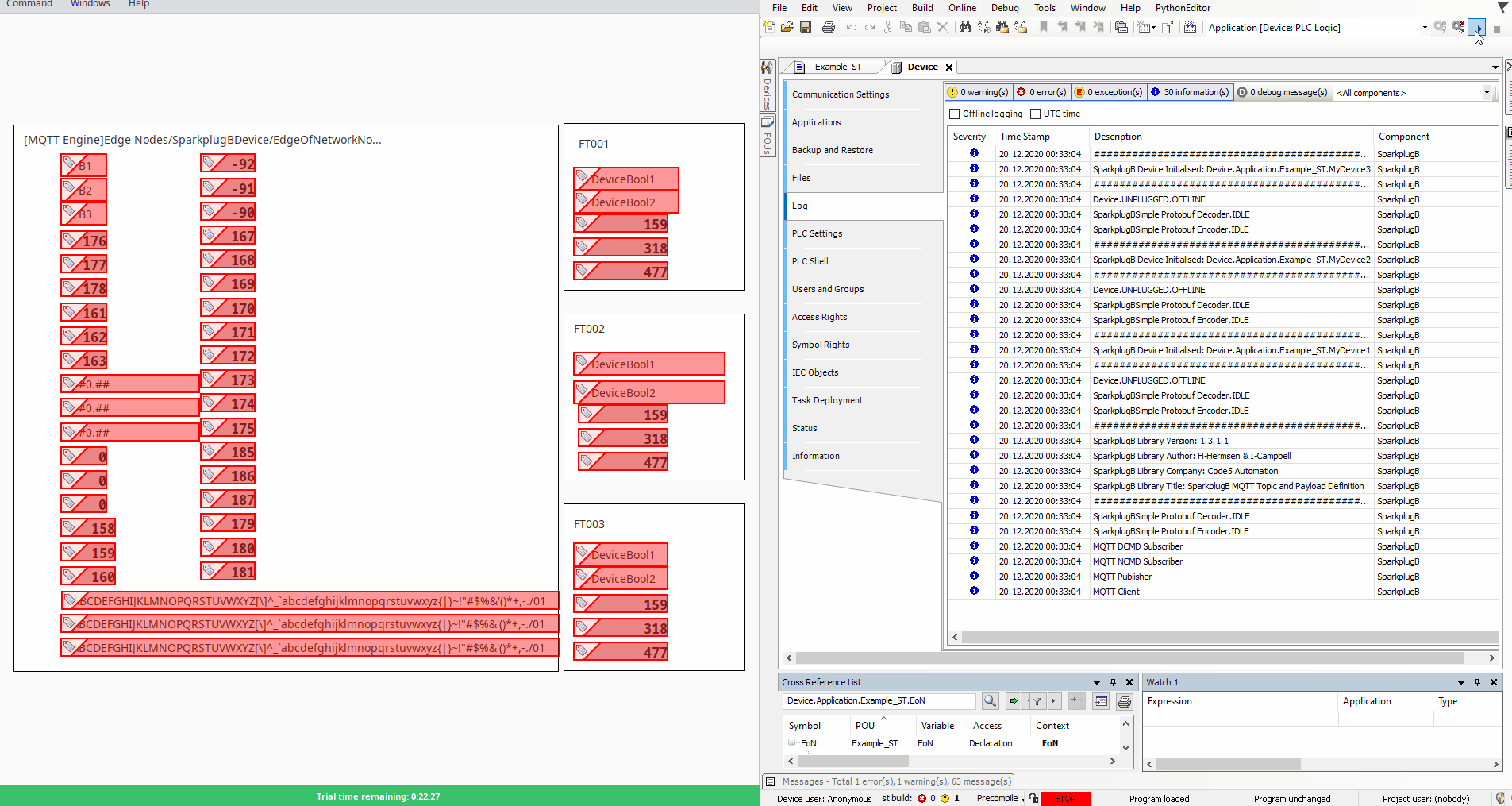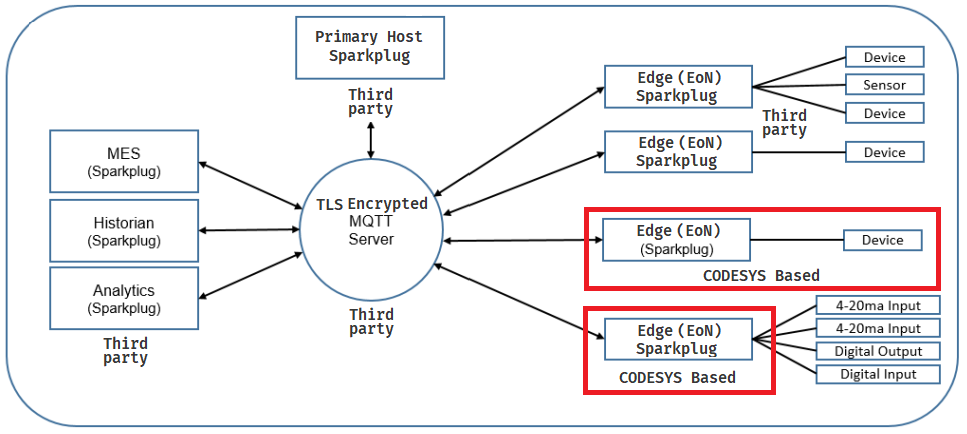Home
Project Members:
- aliazzz
- hermsen (admin)
- i-campbell (admin)


Sparkplug™ and the Sparkplug™ logo are trademarks of the Eclipse Foundation
Copyright © 10/11/19 Eclipse Foundation, Inc. https://www.eclipse.org/legal/efsl.php
co⚡e: Sparkplug™ MQTT edge
Information and guides
Sparkplug™ information | Preview how-to | Setup a test system with Ignition Primary Host | Add SparkplugB to an existing CODESYS project
This Page
Introduction | Sparkplug |Components | Development | Progress | Download | Requirements | Acknowledgements
avg reading time: 5m
Introduction
This project aims to provide CODESYS based automation systems with Sparkplug™ oriented middleware. co⚡e: Sparkplug™ MQTT edge is designed to provide you with a "single point of truth" at the Edge of your installation. It offers you an easy, modern, flexible, free and open way for any of your devices to exchange data in a bi-directional and interoperable way using Sparkplug™ enhanced MQTT.

MQTT
Regular MQTT is a message oriented middleware, intended for SCADA use. Regular MQTT left out all specifications on how topics and payloads should be structured and how devices should behave. This allows regular MQTT to be easily adopted in different industries, but it lacks any standardized topics or payload formats. This is where Sparkplug™ steps in the game.
Sparkplug
Sparkplug™ has been designed by the co-author of MQTT, Arlen Nipper, and adds several smart features on top of regular MQTT. Sparkplug™ provides MQTT with a vendor-neutral specification for the data formats, topic structures, state management, and how topologies should be structured in IIoT scenarios. These rich enhancement "on top" of MQTT results in a "Sparkplug™ enhanced MQTT". It provides you a flexible architecture which allows you to auto-discover edge nodes, devices and their metrics (data & metadata) as devices. Applications now can be added and removed anytime without affecting the system as a whole. Report by Exception (RBE) saves bandwidth, memory and computational power on the producer and the consumers of data. Last but not least, your data can be delivered securely via the latest industry strength security specifications and with rich meta-data for added context. This library offers you a simple, reliable, open and secure solution to your asset monitoring and control needs.
Sparkplug™ benefits
A comparison between Sparkplug™ B and regular v3.1.1 MQTT.
| Benefit | Sparkplug™ B | MQTT v3.1.1 |
|---|---|---|
| Simple | ⚡ | ⚡ |
| Open | ⚡ | ⚡ |
| Pub / Sub | ⚡ | ⚡ |
| Last Will and Testament | ⚡ | ⚡ |
| Session Awareness | ⚡ | ⚡ |
| Persistent Connections | ⚡ | ⚡ |
| Decouples devices from applications | ⚡ | ⚡ |
| TCP/IP Security (TLS) | ⚡ | ⚡ |
| HTTPS WebSockets | ⚡ | ⚡ |
| Standardized Payload definition | ⚡ | |
| Standardized Topic Namespace definition | ⚡ | |
| Auto discovery of Nodes, Devices, Metrics, Properties and Templates | ⚡ | |
| Meta-data for Metrics | ⚡ | |
| Metric Properties | ⚡ | |
| Bandwidth efficient | ⚡ | |
| Aliases | ⚡ | |
| Death and Birth Certificates | ⚡ | |
| Report by Exception (RbE) | ⚡ | |
| Bi-directional data-transfer between Host and Node | ⚡ | |
| Metric Templates (complex datatypes) | ⚡ | |
| Setup with minimal coding | ⚡ | |
| File Transfer | ⚡* | |
| Historical Store and Forward | ⚡* | |
| High Availability | ⚡* |
- Advanced features subjected to Roadmap
- read up on the Requirements.
Goal
Providing the CODESYS ecosystem a secure and full specification compliant implementation of Sparkplug B Edge and Device which run on any sufficiently capable CODESYS based PLC.
Since our solution is implemented in 100% IEC ( it contains no embedded C or C++ components), the library is easily portable over various brands and types of industrial controllers.
In short, this solution aims to "marry" CODESYS with the Sparkplug™ MQTT protocol and further open up the vendor-independent CODESYS ecosystem with the IIoT market, thus fully exploiting the synergy between CODESYS, IIoT and MQTT through Sparkplug.
Last but not least
Our library is open source, which should allow any experienced programmer to add or alter the code. It allows for peer to peer code review and to expand on the existing code base. The Sparkplug™ specification has been released with open-source in mind, and we are delighted to share our library also! Of course the CODESYS runtime and MQTT library we utilize are not open-source.
Components
An overview of the components in this library are lined in red;
Sparkplug B Edge, usually 1 per controller.
Sparkplug B Device (plugs into an Edge), usually several per controller

The library allows for a mix with regular third party capable Sparkplug™ MQTT devices.
Details on the different components in the infrastructure:
- [Infrastructure] explains various node functions like Edge, Device, Primary Host, etc etc.
- [Security] explains the available security levels,
- [Messages] explains the various defined sparkplug messages and their payloads.
Development
Some documents and (software) tools we use while developing are
-
SparkplugB Specification
https://github.com/eclipse/sparkplug/blob/develop/specification/
-
Ignition as Primary Host node
We test our code against Ignition as Primary Host node and against the Sparkplug TCK when it is available.
However, we are also in full preparation of developing a CODESYS variant of a Primary Host.
To experience the full capabilities of Sparkplug in action, you can create your own free test system using this setup guide:
Setup a test system with Ignition Primary Host.
When our Primary Host node is finished, no explicit need for Ignition exists -
TCK Toolkit
We will test and verify our solution against the TCK toolkit once available
-
co♻e: A unittest framework for CODESYS based systems
We aim to cover the entire solution with pragmatic unit, integration and pov tests.
For more information see #co♻e -
MQTT Explorer
MQTT.fx supports limited SparkplugB payload protobuffer decoding so it is a very good & flexible test client.
http://www.jensd.de/apps/mqttfx for more information
MQTT.fx is published under Apache License, Version 2.0. -
MQTT Client Library Usage
Under the MIT license you are free to use the co⚡e: Sparkplug™ MQTT edge and host library.
You are free to implement and use another MQTT client implementation. If you do, we urge you
to implement a stable & 100% MQTT v3.1.1 capable library.
However, in this project we will use the following library;- https://store.codesys.com/iiot-libraries-sl.html
Without a valid license, the software runs for 30 minutes in demo mode.
- https://store.codesys.com/iiot-libraries-sl.html
Progress
Timeframe
Milestones are set and progress is being made. You can read our progress blog here
Providing help in development is welcomed, we are looking forward to work with you.
Roadmap
This roadmap is subjected to change without prior notice.
No liabilities shall be taken!
Completed milestones are clearly marked.
v1.0.0.0 Basic version: Minimalistic Edge Node with TLS support
- MQTT Pub/Sub Support,
- Google Protobuffer payload encoding/decoding,
- Sparkplug™ for MQTT, responsible for publishing of Sparkplug™ Topics & Payloads,
- Metric Payload Support for: UINT8, UINT16, UINT32 UNIT64, INT8, INT16, etc,* [ ]
- Edge Node, responsible for publishing Node metrics,
- Edge Server Commands supported: NCMD Rebirth,
- Edge TLS Support,
- Debugging / Optimization/ Refactoring of Minimal Viable Product.
- Package v1.0.0.0 Released
v2.0.0.0 Standard version:
Full-spec Edge and Device implementation
- All Datatype Metrics supported,
- Device support, acts as a digital representation of a physical device sending metrics,
- Receive Server Commands, setpoints etc, (xCMD),
- Bind multiple Devices to Edge,
- Machine to Machine Communication,
- [x] Separated libraries:
- co⚡e: Sparkplug™ MQTT Stack - Contains a common basis for Edge and Host solutions,
- co⚡e: Sparkplug™ MQTT Edge - Contains Edge and Device solution,
- co⚡e: Sparkplug™ MQTT Host - Contains Primary Host solution,
- co🔗e: A Linked List Solution (mandatory)
- [x] Support for Metric Properties,
- Read Only Property (Mandatory Included),
- Any User Defined Property,
- Ignition verified,
- [x] Support for Aliases,
- Edge / Device send server xBIRTH & xDATA via Alias
- Edge / Device receive server xCMD via Alias
- Ignition verified
- [ ] Template i.e. Edge / Device complex variables (nested structs) support,
- Edge / Device send server xBIRTH Template support,
- Edge / Device send server xDATA Template support,
- Edge / Device receive server xCMD Template support,
- Ignition verified
- [x] WebSockets support,
- HTTP ( ws://...:8080 ) verified,
- HTTPS through TLS Support ( wss://...:8083 ) Experimental,
- Proxy Settings (Server Address, Port, Username, Password)
- [x] Edge auto-publishes properties like
- ABOUT / MIT LICENSE (mandatory),
- Compiler version,
- Runtime Version,
- NIC info (up to 8): name, MAC & IP addresses,
- OS version, etc,
- Extended Info Opt-Out,
- Ignition verified.
- Edge / Device send xDEATH certificate when offline,
- TCK test to (auto)test the solution to maturity,
- Unit/TDD testing,
- Debugging / Optimization/ Refactoring of Standard package
- Release of Package v2.0.0.0
v3.0.0.0 Advanced Version:
Version Mature Full-Spec Edge, Device and a peer-2-peer implementation sporting user-friendly advanced features
- [x] Edge
- File Transfer,
- Store and Forward,
- Historical data support (store and forward based)
- High Availability (HA) support.
- [x] CODESYS based Peer-2-peer Edge node implementation,
- Server decode Edge / Device xBIRTH,
- decode Edge / Device xDATA,
- decode Edge / Device xCMD,
- decode Edge / Device xDEATH & LWT -> Data becomes STALE
- decode Edge / device xCMD (DATA)
- Strict enforcing of SEQ / BDSEQ check,
- Server sends Edge NCMD REBIRTH,
- Metric property support,
- WebSocket support,
- Alias Support,
- Template Support.
- Debugging / Optimization/ Refactoring of Advanced package.
- Release of Package v3.0.0.0
Download
By downloading and using our software you abide by the MIT License
The co⚡e: Sparkplug™ MQTT edge and host library is MIT licensed and open source, however to run it you will need to install IIoT Libraries Bundle SL.
Download co🔗e: Linked List
Download co⚡e: Sparkplug™ MQTT Stack
Mandatory: Contains Linked List solution and contains the common basis for he Edge/Device and Primary Host solution. You need both these libraries in order to run Edge/Device or deprecated xPerimental Primary Host.
Download co⚡e: Sparkplug™ MQTT Edge
Contains the Edge & Device solution.
Download co⚡e: Sparkplug™ MQTT Host
Contains the deprecated xPerimental Primary Host solution.
Download co⚡e: Sparkplug™ MQTT Example for Edge and Host
To run the example project you need all of the above libraries.
A small guide on how to get started with the example can be found here: Preview how-to
Requirements
| System requirements and restrictions | Info |
|---|---|
| Programming System | CODESYS Development System Version 3.5.16.0 or higher |
| Runtime System | CODESYS Control Version 3.5.14.0 or higher |
| Licensing | A separate CODESYS IIoT libraries SL per Runtime |
| Required Accessories | Any 100% fully compliant MQTT v3.1.1 broker or cloud service. Sparkplug requires the following: QoS 0 and 1, Retained Messages, Last Will and Testament, A flexible security system. |
| Restrictions | Broker/Cloud service with MQTT v3.1.1 support in full. |
NOTES
If you have no licenses available, you can still test Sparkplug with the following limitations:
- Ignition Enterprise SCADA runs in a DEMO trial period for 2 hours or choose to opt-in for a FREE maker Edition.
- Any unlicensed CODESYS runtime runs in a DEMO trial period for 2 hours, after that a restart of the runtime is mandatory,'
- Any unlicensed IIoT SL library runs in a DEMO trial period for 30 minutes, after that period a re-download the runtime is mandatory.
For tips on pricing, read this FAQ [questions:#9]
This library is MIT licensed, you are free to exchange the licensed MQTT Client SL for any other MQTT client you see fit.
This will be done by you. We can offcourse help by providing you with tips or hints or some small assistance.
Acknowledgements
We are passionate software developers who develop and maintain co⚡e in our spare time.
CODESYS supports us in our efforts by providing a free and open source platform for everybody to use.
Read more on #co5e


Project Members:
- aliazzz
- hermsen (admin)
- i-campbell (admin)
Sparkplug™ and the Sparkplug™ logo are trademarks of the Eclipse Foundation
Copyright © 10/11/19 Eclipse Foundation, Inc. https://www.eclipse.org/legal/efsl.php
Related
Home: Add SparkplugB to existing CODESYS project
Home: General Sparkplug info
Home: Infrastructure
Home: Messages
Home: Preview how-to
Home: Security
Home: Setup a test system with Ignition Primary Host
FAQ: #9